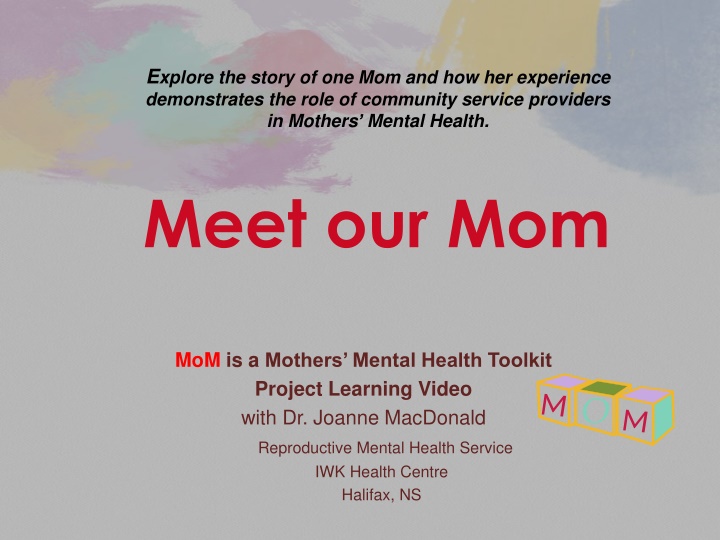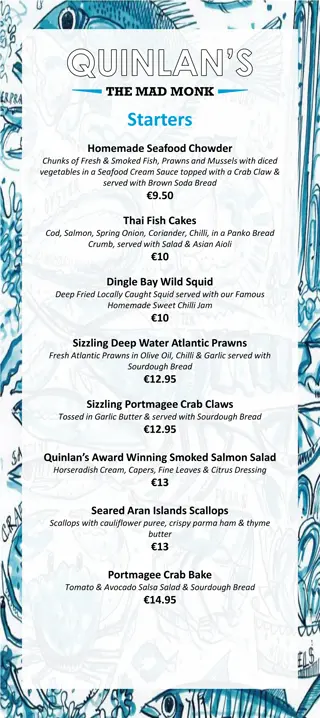Supporting Maternal Mental Health: A Community Service Provider's Role
In this story, we meet Kerry, a young mother facing mental health challenges, who seeks support from a community service provider. Through Kerry's experience, we see the importance of community service providers in promoting mothers' mental well-being. As Kerry navigates her past struggles and current difficulties, the community service provider plays a crucial role in offering guidance, programs, and a supportive environment to help Kerry on her journey towards better mental health.
Download Presentation

Please find below an Image/Link to download the presentation.
The content on the website is provided AS IS for your information and personal use only. It may not be sold, licensed, or shared on other websites without obtaining consent from the author.If you encounter any issues during the download, it is possible that the publisher has removed the file from their server.
You are allowed to download the files provided on this website for personal or commercial use, subject to the condition that they are used lawfully. All files are the property of their respective owners.
The content on the website is provided AS IS for your information and personal use only. It may not be sold, licensed, or shared on other websites without obtaining consent from the author.
E N D
Presentation Transcript
Explore the story of one Mom and how her experience demonstrates the role of community service providers in Mothers Mental Health. Meet our Mom MoM is a Mothers Mental Health Toolkit Project Learning Video with Dr. Joanne MacDonald Reproductive Mental Health Service IWK Health Centre Halifax, NS
MeetourMom MoM As a community service provider to mothers and young families you can create opportunities to promote and support mothers mental health. A mother s positive mental health promotes the development of her child in physical growth and health, a solid self-esteem, confidence and skill in learning, emotional regulation and relationship success throughout life.
MeetourMom MoM In the series, Meet our Mom MoM, the Mothers Mental Health Toolkit Project team will introduce you to case descriptions drawn From the real experiences of our mental health clinicians and our Family Resource Centre partner staff. These Moms have common presentations and problems that will challenge you to define your possible role and contributions to her well being. The Moms will also provide examples of how you might use some of the Toolkit resources in your work. Have a copy of your Toolkit out for reference as we begin to Meet our Moms. You could also print off this presentation and make notes as you go.
MeetourMom Kerry Kerry is a 23 yo mother working part-time in convenience store; Parenting 8 mo and 3 yo boys Lives in apt with boyfriend Jack,38, who works seasonally. He is father to another 12 yo girl who lives with her mother. It was suggested to Kerry by the Public Health Nurse to check out programs at your centre. She is said to have problems with depression and anger since her early teens, and has been seen at your local mental health clinics off and on. She makes the call to you but seems tense and irritable. That nurse Susan said I should call here; what are you guys anyway, like a clinic or something; I don t know if I can be dragging two kids to programs all the time I don t really like other girls and being in a group thing. I get along better with guys really
MeetourMom Kerry You explain your centre s approach and programs and Kerry comes in to see you several days later. She is a petite energetic, very stylishly groomed young mother, very organized with the children with a confident manner. As she gets to know you, she discloses that her mother had mental illness and addictions problems and she went back and forth with several aunts before she went out on her own at 16. There is a history of cutting behaviors, relationship turmoil and early school leaving. the teachers didn t like me mental health was no help . She tends to expect everything to go just right and you begin to see anger and frustration when it doesn t; she is very talkative with the other moms at programs, but you hear that she feels two of the women are talking about her outside of the centre. She hints at a history of physical abuse in the past I sure know what it s like to get slammed around; toughened me up but she says this with a grin and a laugh, as though it wasn t serious.
MeetourMom Kerry What are 3 possible mental health issues for Kerry? 1. 2. 3.
MeetourMom Kerry The Toolkit Project team identified: 1. There is possibly a disconnect between the traumatic events Kerry tells you a little bit about and her confident manner could she have a public face and a different private experience? And a trauma history of some sort? 2. Her story of turmoil and relationship trouble since childhood suggests patterns of poor coping and interpersonal functioning despite her confident manner. 3. Possible difficult attachment with her mother?; could contribute to the high value she puts on cleaning, organization and the public presentation of herself and the children. Seems less comfortable with the emotional nurturing aspects of mothering. She holds herself and others to high possibly rigid standards.
MeetourMom Kerry What would you like to know more about with this MOM? 1. 2. 3.
MeetourMom Kerry The Toolkit team wondered about: 1. When she chats at break times she often speaks of how other people have let her down. Can she identify what she feels are her strengths as a person? She tells you she could do well at school when she could concentrate, is a very organized person for whom doing the best job is very important, likes to contribute to a group effort, and she hopes others can see she is trying really hard to be a good mother.
MeetourMom Kerry The Toolkit team wondered about: 2. What was Kerry s experience of being parented? You approach this as a general topic in a group you re leading. After other women speak, Kerry says her mother slept a lot, she was a good person but had a lot of problems . There wasn t good organization in their homes, often little food, no extended family or father figure in her life. Just a bunch of different loser boyfriends Kerry can see that her focus on being tidy, organized, on top of things with her children is a deliberate attempt to provide what her mother couldn t. Kerry says her mom was an emotional person, super loving one minute, almost better when she was drunk, but then other times it was like I was more than she could handle and she d get mad and lock the door to her room and say I had to play by myself and give her some peace . This telling affects everyone in the room; it feels powerful; you feel concern for Kerry and her confident way is less convincing now, or is it resilience?
MeetourMom Kerry The Toolkit Team wondered about: 3. Can Kerry identify what happens for her in relationships generally? She tells you she knows she has issues with trust from her childhood, but people do look out for themselves always you know and feels she gives a lot to people only to have them disappoint her. Then I have my freak-outs . I can t breath, I m angry and I feel like smashing something or someone, then I cry and take to myself; when I was younger I used to cut then. Can t do that anymore. And then I know I just have to cut that person off totally; like Jack and I have broken up a lot Are there any successful relationships? Jack works a lot and mostly follows Kerry s lead, tries to make her happy and calm her but he finds her sudden shifts in mood difficult. Kerry really likes when Jack s mother comes to visit from Ontario a couple of times a year. She is a calm and positive person, and likes to help with the children. Some days I wish she had been my mom instead of Jack s but she lives far away and still has her job .
MeetourMom Kerry What could be the role for you or your organization in her mental health as a mother? 1. 2. 3.
MeetourMom Kerry Possible roles and contributions: 1. You have good clues that she has perfectionistic ideals as a mother; some presentation of the realistic expectations of mothering could lessen her tension and tendency to blow up when things don t go perfectly. 2. All mothers can benefit from tips and encouragement in fostering attachment and positive parenting skills. Parent support and education in a balanced non-judgemental style will help her greatly, and broaden her ideas about how to be the good mother that is so important to her. 3. You recognize that her sudden shifts in emotion and judgement reflect deeper concerns and issues. Your role is not to become the primary counsellor around this emotional dyscontrol. You could be encouraging a planned assessment with mental health services in your area and helping her prepare for that assessment.
MeetourMom Kerry How might you use the Toolkit resources with Kerry? Kerry could benefit from a less demanding and more flexible picture of herself mothering effectively Pages 48 and 49 might be tools to encourage a discusssion of the many roles a mother has
MeetourMom Kerry Kerry has identified intense rapidly changing emotions as part of her difficulties, and you can see how this might play a role in how others experience her in relationships. Pages 57, 58 and 59 demonstrate strategies for emotion regulation for anyone; you can walk through each idea with Kerry and see if you can think of alternate coping responses.
MeetourMom Kerry You are struggling to understand Kerry and help her without trying to be a therapist as this isn t your training or expertise. Page 126 describes Diagnostic Possibilities Kerry has many features of Personality Disorder as described there
MeetourMom Kerry There are many ways in which you indirectly but importantly support change and wellness in vulnerable mothers. Page 141 lists some General Interventions for you to consider
MeetourMom Kerry Key Points in supporting women with difficulties in coping style and interpersonal effectiveness 1. Patterns in relationships are often learned somewhere else and repeated out of habit and need; even if the patterns seem very ineffective the woman may keep trying to make things work the way she thinks they should, rather than what she has experienced. 2. Try to remember what the initial problem was before the escalation, and respond from a neutral state of your own emotion and from what you know to be typical, rather than react to the distress and heightened emotion of the woman. 3. Women who had their own difficulties with attachment and/or trauma often don t know or practice basic self-care and self-calming strategies. You can encourage them they deserve to learn how.
MeetourMom Kerry Other Resources: http://perinatal.anxietybc.com Anxiety Disorders organization s website from British Columbia with specific information and downloads for pregnant and new mothers; helpful guides to relaxation and emotional regulation techniques The Dialectical Behavior Therapy Skills Workbook. Matthew McKay, Jeffry L. Wood & Jeffry Brantley. New Harbinger Self-Help Workbook. 2007 a self-help guide for those with good motivation and reading skills to use the techniques of a therapy designed for improving emotional regulation - in a self-care model























